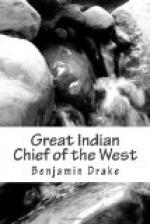“The American Indian is sometimes regarded as a being who is prone to all that is revolting and cruel. He is cherished in excited imaginations, as a demoniac phantasm, delighting in bloodshed, without a spark of generous sentiment or native benevolence. The philosophy of man should teach us, that the Indian is nothing less than a human being, in whom the animal tendencies predominate over the spiritual. His morals and intellect having received neither culture nor developement, he possesses on the one hand, the infirmities of humanity; while on the other the divine spark in his heart, if not blown into a genial warmth, has not been extinguished by an artificial polish. His affections are strong, because they are confined to a few objects; his enmities are deep and permanent, because they are nursed in secret, without a religion to control them. Friendship is with him a sacred sentiment. He undertakes long and toilsome journeys to do justice to its object; he exposes himself, for its sake, to every species of privation; he fights for it; and often dies in its defence. He appoints no fecial messenger to proclaim, by an empty formality, the commencement of war. Whilst the European seeks advantages in the subtle finesse of negociation, the American pursues them according to the instincts of a less refined nature, and the dictates of a less sublimated policy. He seeks his enemy before he expects him, and thus renders him his prey.”
No better evidence need be adduced of his capacity for a lively and lasting friendship, than the history of Pennsylvania, during the life time of the founder. It is refreshing and delightful to see one fair page, in the dark volume of injustice and crime, which American annals, on this subject present. While this page reflects upon the past an accumulated odium, it furnishes lessons for the guide and edification of the future. Let me invite the philanthropist to this affecting story.
A chief object of Penn, in the settlement of his province, was neither land, gold nor dominion, but “the glory of God, by the civilization of the poor Indian.” Upon his arrival in Pennsylvania, the pledge contained in his charter was redeemed by a friendly compact with the “poor Indian” which was never to be violated, and by a uniform and scrupulous devotion to his rights and interests. Oldmixon and Clarkson inform us, that he expended “thousands of pounds” for the physical and social improvement of these untutored and houseless tenants of the woods. His estate became impaired by the munificence of his bounty. In return for benevolence so generous and pure, the Indians showed a reality of affection and an ardor of gratitude, which they had on no previous occasion professed. The colony was exempted from those calamities of war and desolation, which form so prominent a picture in the early annals of American settlements. During a period of forty years, the settlers and natives lived harmoniously together, neither party complaining of a single act of violence or the infliction of an injury unredressed. The memory of Penn lived green and fresh in their esteem, gratitude, and reverence, a century after.




